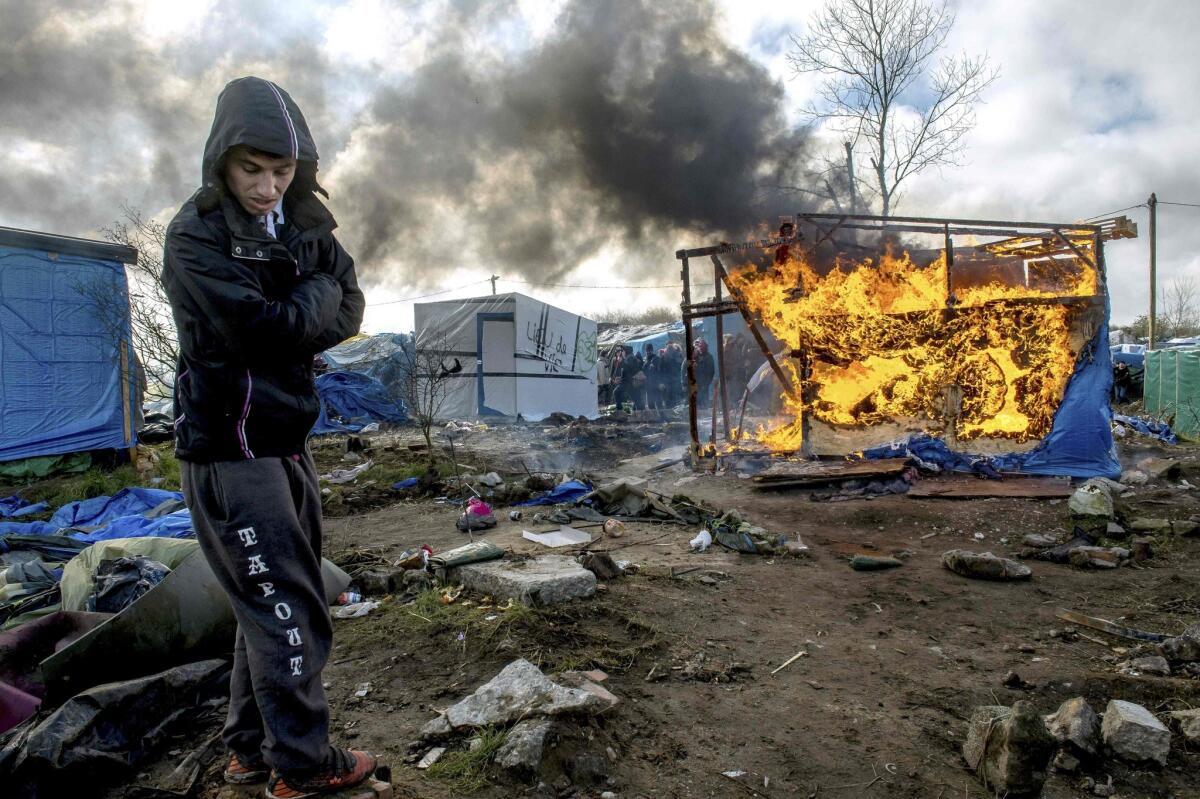London mayor reacts to French threats over ‘Brexit’: ‘Donnez-moi un break’

A man stands by as a makeshift shelter burns in the so-called Jungle migrant camp in the French port city of Calais on Thursday.
- Share via
Reporting from London — The migrant crisis became a critical bargaining chip in the debate over Britain’s future membership of the European Union on Thursday, with France warning that a “Brexit” could bring immigration chaos to its neighbor’s shores.
French President Francois Hollande stated bluntly that there would be serious “consequences” for Britain if the public votes in favor of leaving the 28-member bloc in a June referendum.
Earlier in the day, French economy minister Emmanuel Macron went even further by saying a vote to leave the EU could mean France no longer allows British border police to operate in the port city of Calais.
His comments stoked fears that this could potentially pave the way for thousands of migrants to arrive unimpeded on British shores.
“The day this relationship unravels, migrants will no longer be in Calais,” Macron was quoted saying in the Financial Times newspaper.
Downing Street officials said they had no prior knowledge of Macron’s speech, but the statement fell on deaf ears to “exit” campaigners and the words “stitch up” and “scaremongering” were quickly banded around.
See the most-read stories this hour >>
“Donnez-moi un break,” said London Mayor Boris Johnson, using broken French to say “Give me a break.”
“You have to wonder about the timing of this particular venture,” he added. “I think this is all part of a project to try and scare people into wanting to stay in the EU when actually all the arguments are in favor of us taking back control and being brave enough to stand on our own two feet.”
There has been no love lost between Prime Minister David Cameron and Johnson in recent weeks after the mayor, who is also a Cabinet minister, declared his allegiance to the exit campaign despite the prime minister’s best efforts to win him over.
NEWSLETTER: Get the day’s top headlines from Times Editor Davan Maharaj >>
The two have long been political rivals and many believe Johnson’s stance is motivated by his own desire to hold the keys to 10 Downing Street one day. For his part, Cameron dismissed as “nonsense” any suggestion that there was a conspiracy around Macron’s comments aimed at giving an edge to the “stay” campaign.
“The best thing to do is to listen to the arguments, to listen to what people are saying, and to understand some of the risks and some of the uncertainties about leaving the European Union,” Cameron said.
In Macron’s interview with the Financial Times, he warned that the 2003 Le Touquet agreement could be threatened if Britain decides to leave the EU.
The deal allows British border guards to be stationed in Calais to ensure that anyone without proper papers is denied entry before even reaching British soil.
This has led to the establishment of the so-called Jungle encampment, where thousands of migrants fleeing their war-torn homelands in the Middle East and Africa have set up tents while hoping to reach Britain.
Attempts to dismantle the camp by French demolition teams this week have been met with fierce resistance.
Members of the so-called Brexit campaign said the French statements were all part of a drive by the “Euro establishment” to keep Britain within the EU and sow “seeds of doubt” in the minds of British voters.
And, they argued, the Le Touquet agreement has nothing to do with the EU as it is solely between Britain and France.
“If they suddenly turned around and said the border is not there anymore, we are not going to suddenly let very large number of migrants come through the Channel Tunnel into Britain,” said Chris Grayling, leader of the House of Commons, who is campaigning to leave the EU.
“But what it will do is attract large numbers more migrants to Calais, which is not what they want. So we’re getting mixed message from French ministers.”
Even though Hollande did not reiterate the strong words of his economy minister, he did not rule out that a British exit could put a strain on the current border control status quo.
“I don’t want to scare you, I just want to say the truth -- there will be consequences,” he said, adding that a British exit would not jeopardize the two nations’ longstanding diplomatic friendship, but would undoubtedly affect British immigration and its economy.
Hollande made his comments at a press conference with Cameron at the end of a one-day Britain-France summit in the northern French city of Amiens, where the two leaders discussed security and international issues, including the conflict in Syria and Iraq and the migrant crisis consuming Europe.
Cameron announced that Britain would give $24 million to help French authorities deal with the migrant problem in Calais and that unaccompanied child migrants in Calais with direct family in Britain would be reunited with their relatives.
This policy is already in place but its implementation has been slow.
Britain and France also announced a joint initiative to spend $2.1 billion on a new generation of combat drones, described as “the most advanced of its kind in Europe.”
Boyle is a special correspondent.
ALSO
Oscar Pistorius denied chance to appeal and now faces sentencing for murder conviction
Blunder turns deadly when two Israeli soldiers using Waze drive into a Palestinian camp
Honduran environmental leader and rights activist Berta Caceres slain by assailants
More to Read
Sign up for Essential California
The most important California stories and recommendations in your inbox every morning.
You may occasionally receive promotional content from the Los Angeles Times.










